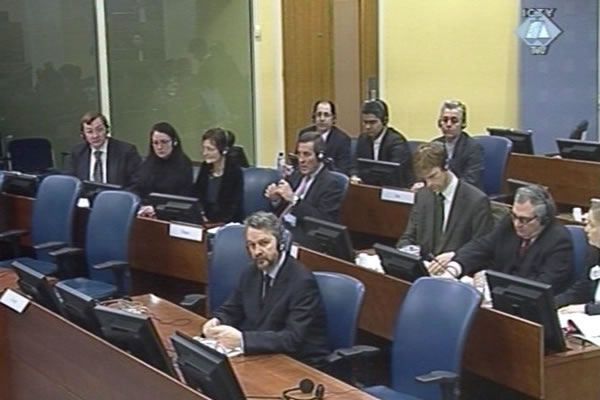Home
KARADZIC: ‘NOTHING WAS AS IT SEEMED’
Radovan Karadzic seeks documents related to the effort to arm the BH Army in order to show that ‘nothing was as it seemed’. The representatives of Germany, France, Croatia and Iran noted that they either didn’t have documents the accused had requested or couldn’t disclose them for national security reasons. Due to ‘technical difficulties’, BH representatives were not able to attend the hearing today
 The representatives of Germany, France, Croatia and Iran in the courtroom
The representatives of Germany, France, Croatia and Iran in the courtroom A hearing was held today at the Tribunal to discuss Radovan Karadzic’s request to issue binding orders to several countries to compel them to submit documents the accused believes are relevant for his case. The Trial Chamber invited the diplomatic representatives of Germany, France, Croatia, Bosnia and Herzegovina and Iran to attend the hearing. BH representatives were unable to attend the hearing due to ‘technical difficulties’.[IMAGE]4571[/IMAGE]Presiding judge Kwon expressed his regret that BH ‘missed the opportunity’ to take part in the discussion, organized, as Judge Kwon noted, ‘for the benefit and in the interest of the countries and not of any of the parties in the proceedings’.
The representatives of the four countries noted that Karadzic’s requests were vague and too broad to be used in the search of the archives, adding that some of the requested documents were not in their archives, the documents in their archives were not relevant for Karadzic’s case or couldn’t be disclosed for national security reasons. The representatives of all four countries noted that they finished with the searches of the archives following Karadzic’s request.
Karadzic for the most part asked for the documents related to the effort to arm the BH Army when the arms embargo was in place in the former Yugoslavia. The accused contends he will prove that some countries whose troops were in BH in the UN peace-keeping force were ‘warring factions rather than neutral’. As Karadzic put it, there were four warring factions in BH: Serbs, Croats, Muslims and the international community: some UN members ‘which worked to further their own interest’. Challenging the neutrality of the international community and its representatives, Karadzic is laying the groundwork for contesting the credibility of Western diplomats and generals appearing before the Tribunal as prosecution witnesses. In Karadzic’s words, ‘how can we believe that the representatives of the countries that violated the UN embargo and armed the Muslims in Srebrenica… will be objective witnesses’ of what had happened during the war.
Karadzic also indicated he intended to prove at the trial that the takeover of the Srebrenica enclave was ‘a legitimate military operation and not a criminal enterprise’. Karadzic is determined to prove that ‘nothing was as it seemed’: as alleged in the indictment charging him with genocide and other crimes in BH.
The Trial Chamber will rule later on Karadzic’s motion to issue binding orders to compel the states in question to hand over the documents.
Linked Reports
- Case : Karadzic
- 2010-02-12 KARADZIC’S MOTION AGAINST APPOINTMENT OF STANDBY COUNSEL DISMISSED
- 2010-02-01 KARADZIC CALLS FOR ANOTHER POSTPONEMET OF THE TRIAL
- 2010-01-28 KARADZIC ANNOUNCES HE WILL CALL FOR POSTPONEMENT OF HIS TRIAL
- 2010-02-26 KARADZIC’S MOTION FOR POSTPONEMENT DISMISSED
- 2010-03-01 RADOVAN KARADZIC’S ‘MARBLE TRUTH’
- 2010-03-02 KARADZIC: ‘ONLY GOD SAVED US’
